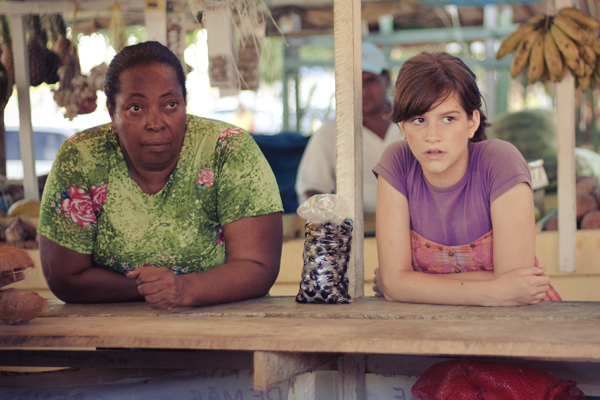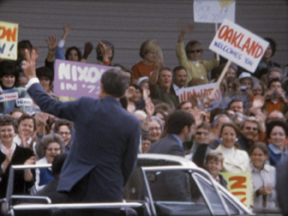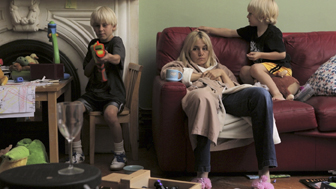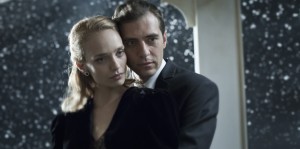Brazil has been well represented throughout the years at the annual New Directors/New Films series, and this year Marcelo Lordello’s They’ll Come Back arrives, following last year’s Neighboring Sounds, which made quite a splash. Here’s hoping for more of a Brazilian new wave offering engaging, clear-eyed, and varied vivisections of contemporary life, of both rich and poor, black and white. (Both filmmakers are based in the northeastern city of Recife, the country’s fifth largest.) If you were to take a chance and buy a ticket for this new film, you will find ample rewards. Other promising discoveries without a distributor (as of yet) share the spotlight in this round-up.
Lordello directs an exceptional cast of mostly nonprofessionals, in which the viewer is thrown for a loop as much as 12-year-old Cris (a no-nonsense Maria Luiza Tavares), as the initial set-up poses one mystery after another. First, why has this white middle-class girl, and her slightly older brother, been left stranded by her parents on the side of a quiet country road, not far from where they vacationed? Unable to find reception for the cellphone, the brother goes off to a gas station, leaving Cris behind to wait in case the folks return—but he never comes back. She sleeps through the night with only the clothes on her back, without food or water.
For the stranded Cris, the larger world may be strange or unfamiliar, but it can also be welcoming and eye-opening. Though geared for adults, this quiet and enfolding film feels like a remarkably perceptive YA novel, and score one for the girl, who is more mature and aware than her self-centered brother.
The protagonist of Die Welt also takes a journey, here through post-revolutionary Tunisia. With a droll touch, Dutch-Tunisian director Karim Alexander Pitstra offers a scattered look at 23-year-old Abdallah (Abdelhamid Naquara), a pessimist figuring out what he wants to do in his life (a not-so-subtle stand-in for the country). His options, as he sees them, are crossing illegally to Italy with a group of friends, or playing the “honey trap,” hooking up with a Dutch tourist and returning with her to Europe (“the World,” as referred to in the title), under the approving eye of his father, who did the same thing decades ago. Given that both Abdallah and the woman are attracted to each other, the motivations are less calculating than they sound. Sweet, surreal, and streetwise, Die Welt is an involving hybrid, besides a loose combo of scripted moments and on-the-street reporting.
In the documentary Anton’s Right Here, Ukrainian-born director Lyubov Arkus plants herself right in the thick of the action. Years before she began shooting, she encountered an essay written by an autistic boy, Anton. Impressed by how he expressed himself through his writing, Arkus followed up seven years later with a film crew. Now a teenager, Anton no longer writes and has become withdrawn. He first evades the lens but then embraces the attention and, literally, the director. Then he won’t let the camera out of his sight.
And boy, has the director found a compelling story line: Anton’s mom is dying from cancer, and she doesn’t know who will take care of her son (his father lives with a second family). The film has many agendas: part profile, advocacy, and exposé—offering a scathing look at the Russian healthcare system. (It’s a wonder that the authorities allowed cameras into an under-supervised, under-funded facility.) At one point, the director, by her own description, kidnaps the boy from a medication-oriented clinic, and he later thrives in a countryside farm with other special-needs patients, but he becomes aggressive, doesn’t play well with others, and runs away.
But the viewer will be left with a lot of questions. The film doesn’t delve into the entire extent of Arkus’s involvement, who went so far as to buy a home for Anton and took care of him during his mother’s chemo treatments. Remarkably, the overall point of view remains sober—it’s uplifting, but no Kleenex is necessary.
The selection committee has chosen a memorable and fascinating film to close the festival. Our Nixon culls from 500 reels of Super 8 home movies shot by the self-described “Nixon cops,” H. R. Haldeman, John Ehrlichman, and Dwight Chapin. The result is an insular time capsule, and a somewhat snarky tweak, of the country’s most complicated president.
The footage had been sitting in a National Archives vault since the early 1970s, confiscated by the FBI during the Watergate investigation. Among the fly-on-the-wall peeks of history are the president’s phone call to the Apollo 11 astronauts and his groundbreaking visit to China (see the Great Wall pre-tourist boom). Most of the voice-overs have been lifted from thousands of hours of voice-activated Oval Office audio tape recordings that were to become a smoking gun for Watergate investigators. Self-serving and defensive post-scandal interviews with the late Haldeman and Ehrlichman also comprise part of the narration.
Watching the film is like wiretapping a private, high-level conversation. And who can resist the inner-sanctum gossip about Henry Kissinger? But it cannot be confused with a history lesson—not on screen are Nixon’s trip to Russia, Rose Mary Woods, and the Saturday Night Massacre. The war in Southeast Asia remains mostly in the background, though according to the tapes, the administration was fixated on controlling the media coverage of Vietnam War protestors.
A handful of films screenings at ND/NF—The Act of Killing, Blue Caprice, A Hijacking and Stories We Tell—will open in theaters later this year. Below, Nora Lee Mandel and Christopher Bourne continue on, taking a look at other worthwhile films that so far are only playing the festival circuit.
FASCINATING WOMEN AT NEW DIRECTORS/NEW FILMS
With Towheads, debut director and star Shannon Plumb hilariously warns the hipster Girls of Brooklyn what they could look forward to in 10 years as a wife and mother. Amidst exhaustion, noise, and Cheerios, Penelope battles insecurities about aging, parenting, and finding professional satisfaction beyond using her talents on arts and crafts projects with the kids, while forgetting how to appropriately talk to and dress for adults. Cleverly updating themes from Luis Buñuel’s Belle De Jour (1967), without the eroticism, and Frank Perry’s Diary of a Mad Housewife (1970), without the nastiness, Plumb plays out fresh fantasies. Though she credits silent film clowns, and dresses up at one point like Charlie Chaplin, she reminded me more of the elastic Lucille Ball carrying out I Love Lucy’s crazy schemes and tangling with obstreperous objects.
Like Lucy, her fictional spouse is good-naturedly played by her real-life husband. As Matt, Derek Cianfrance, director of the far more depressing marriage portrait Blue Valentine (2010), is a never clearly seen model of the modern frustrating husband—not really chauvinist, but his work isn’t put on hold by parenthood as much as his wife’s. Their own lively kids portray the blonde brothers Cody and Walker, debuting at ages 4 and 7. Though my own battling towheads were their age more than 20 years ago, I laughed out loud in sympathy to Plumb’s aspirations and admiration for how she’s turned a woman’s challenges into entertaining art.
Les Coquillettes is a frothy, feminine counterpart to how Korean director Hong Sang-soo pokes fun at the social and sexual sidebars at film festivals. French director Sophie Letourneur brings to a lakefront fest some version of herself, along with one of her films, and some version of her BFFs, who are a bit too much like cute Sex and the City types. This Sophie cares less about promoting her work than connecting her destiny with actor Louis Garrel (in a just-as-handsome-as-himself cameo); blonde, ditzy sad sack Camille Genaud longs for love; and Carole Le Page, with blunt cut short hair, bluntly wants sex. The creativity comes through the chatty storytelling style, as their woebegone adventures in the film trade are narrated by their self-aggrandizing spins that they tell each other while they snack on the titular macaroni—gee, much as guys would do over beers. This makes folks who actually go to film festivals for the movies look like they are missing a lot of the fun and silly games.
Soldate Jeannette best comes across as an equal opportunity lampoon of the recent financial skullduggery, where a woman, Fanni (Johanna Orsini-Rosenberg), can be just as culpable as a man in embezzling loads of money to support an exaggeratedly materialistic, shiny lifestyle addiction. As the law closes in, Fanni flees back to nature, and escapes into the mind-numbing drudgery of a dull, colorless pig farm alongside the virtually enslaved Anna (Christina Reichsthaler). Using striking images for visual irony (such as stolen cash going up in flames), Austrian director Daniel Hoesl was inspired by the actresses’ backgrounds to set up their contrasting duality, but their saucy formation of an exuberant women’s liberation movement comes across as a fantasy alternative reality that loses satirical bite as they head for some kind of freedom together.
MEN TO REMEMBER AT NEW DIRECTORS/NEW FILMS
The Color of the Chameleon is the first Bulgarian selection by ND/NF in 35 years, so it’s understandable if you may not be familiar with the details of Bulgaria’s awkward transition from totalitarianism since 1990, but you will still laugh at debut director Emil Christov’s absurdist satire. Bulgaria was evidently riddled with informers, so it’s not even that far-fetched that young Batko Stamenov (Ruscen Vidinliev) gets recruited to infiltrate an anarchist book club and pretty much goes crazy with secret spy power as his world turns topsy turvy. The movie inspirations just start at Casablanca (remember the Bulgarians who Rick helps at roulette?), The Cabinet of Dr. Caligari, The Talented Mr. Ripley, and The Matrix, so the inevitably missed political allusions won’t matter. Christov’s long career as a distinctive cinematographer lends a striking look to this adaptation by Vladislav Todorov of his 2010 novel Zincograph (not yet available in English) that is as cynically funny as Catch-22.
Rengaine insightfully whirls through the streets of Paris tracking the tensions between Arab and African immigrants, similar to the style and coincidences in the 2010 Israeli/Palestinian Ajami, but with more romance and even hope. Inspired by the reactions to the relationship of his Sudanese mother and Algerian father, writer/director Rachid Djaïdani intimately follows the relentless efforts of the eldest Algerian brother, Slimane (Slimane Dazi), to thwart his feisty youngest sister’s marriage to a black African Christian. He urgently tries to enlist the support of 39 brothers to stop this modern Romeo and Juliet love match in a colorful and lively tour of the spectrum of immigrant attitudes, ambitions, and lifestyles. Slimane’s fraternal and traditional Muslim responsibilities weigh heavily on him, but become complicated when he examines his feelings for a French Jewish woman and a renegade brother, who defiantly allies with the sweet and determined couple.
With Küf, debut feature director Ali Aydin deftly applies the slow, quietly revelatory style of recent Romanian cinema to similar issues in Turkey to examine how the past authoritarian system haunts a political culture adapting to democracy. The elegiac pacing communicates the unchanging rhythm that is the life of Basri (Ercan Kesal) as he nears retirement from inspecting railroad tracks in the countryside. For 18 years, his other routine has been a stubborn protest—he regularly submits a petition to the government to find his missing son, who was arrested at a protest demonstration. A new police inspector, Murat (Muhammet Uzuner), tries to rectify the past while keeping order in the present, but finds that the old ways are so ingrained that justice is difficult to administer. The two leads were seen last year in Nuri Bilge Ceylan’s Once Upon A Time in Anatolia, and they here, too, subtly communicate with few words the difficult moral choices when tragic circumstances unexpectedly collide between life, work, and bureaucracy.
The Shine of Day plays with the real personas of two contrasting performers, gradually nudging them towards a fictional challenge that sensitively stretches them beyond their comfort zones to warm the audience’s heart. Handsome, charming Philipp Hochmair plays a (presumably) smugger version of himself as a successful actor performing the great works of German theater from Vienna to Hamburg. He delights in losing himself in the masquerade of his roles and avoiding a real life. Then his long-lost uncle shows up on his door step—grizzled Walter Saabel, retired from bear wrestling and knife throwing in an Italian circus. Even as each idiosyncratically circles around the other (in very naturalistic interactions), the more immediate problems of a neighboring family of Moldavian refugees surprisingly sparks Philipp and Walter to discover a new capacity for altruism.
Burn It Up Djassa attempts to capture the kinetic feel of the West African slum streets of Abidjan, the Ivory Coast’s largest city, with dialogue in the vernacular of Nouchi by a collective of actors, writers, crew, and locals recruited by director Lonesome Solo. In a cautionary tale familiar from gritty 1930s movies, siblings pursue conflicting dreams of success. The eldest, Mike (Mamadou Diomandé), a police officer, unsuccessfully tries to keep his brother Tony (Abdoul Karim Konaté) and sister Ange (Adélaïde Ouattara) from getting drawn into a flashy life of crime. The primary strength of the simplistic story filmed with low-budget music video energy is in the ironic contrast in the glorifying narration by the hip hop storyteller (Mohamed Bamba), who recreates their sad reality of limited options into outlaw legend. Nora Lee Mandel
In Emperor Visits the Hell, Li Luo cleverly reworks the classic Chinese novel Journey to the West, and transposes the fantastical world of the original work to the much more anonymously mundane—drab, even—settings of China today. The Emperor, who has murdered his way to the throne, becomes in this iteration a corporate bureaucrat whose court consists of a series of conference rooms. The Dragon King, who is executed for breaking heaven’s laws, is here a petty gangster holding court in a bar/pool hall. Stylistically, Li presents his scenes in poker-faced deadpan mode, with static shots and a low-key delivery that suddenly explodes in the final sequence (which may or may not be documentary) in which the actor playing the emperor rails against China’s societal problems and its lack of support for the arts. The specific details of this tale and how Li transforms it into this modern setting will be somewhat murky for those not familiar with the original story, but the satirical bite of its concept of a China ruled by bureaucrats and small-time hoods comes through loud and clear.
O Muel’s Jiseul depicts the horrific history of the 1948 massacre of civilians on South Korea’s Jeju Island, which arose from a U.S. military order: all people in a five-kilometer zone were to be labeled communists and shot on sight. This story of indiscriminate killing, rape, and torture is presented to us with beautiful images shot in monochrome with great attention paid to the unique landscape. The film focuses on a group of villagers who hid in a cave for 60 days to escape the soldiers hunting them; the title is Jeju dialect for “potato,” which was their sole source of nourishment during this time.
The beautiful images O Muel graces us with may be a bit too beautiful, considering the subject; there is a distancing effect which dampens the emotional impact that the director, himself a native of Jeju, must have wanted to impart by dramatizing this shameful historical episode. Also, the film gives us precious little historical context and explanation for what we see, outside of some brief onscreen titles at the beginning and end. Those unfamiliar with this history may find much of Jiseul frustratingly opaque. Still, O Muel’s often searing details of this particularly disturbing example of man’s inhumanity to man intermittently manage to penetrate the immaculately art-directed haze.
Tower, the first feature by Kazik Radwanski, focuses with deliberately uncomfortable intimacy on the socially awkward, balding 34-year-old Derek (Derek Bogart), an aimless fellow who still lives at home with his parents. The film’s rigorous aesthetic consists almost entirely of close-ups and shallow focus compositions, mostly centered on Derek’s head, as he navigates through environments almost like an alien exploring a hostile, unknowable planet. Derek—with a continuous frown on his face and a nasty cut on his face sustained from a night of clubbing—pushes away everyone around him with an off-putting, abrasive manner. The title refers to Derek’s creative endeavor, an absurd fragment of an animated film about a green creature building rock towers.
The lack of a conventional narrative and the rambling, improvisational structure make the concept feel somewhat overstretched even at its brief 78-minute length. However, Radwanski admirably eschews the impulse to bait the audience into making its anti-hero sympathetic or even entirely understandable, which renders Tower a fascinating hybrid of experimental and narrative modes of filmmaking. Christopher Bourne











Leave A Comment